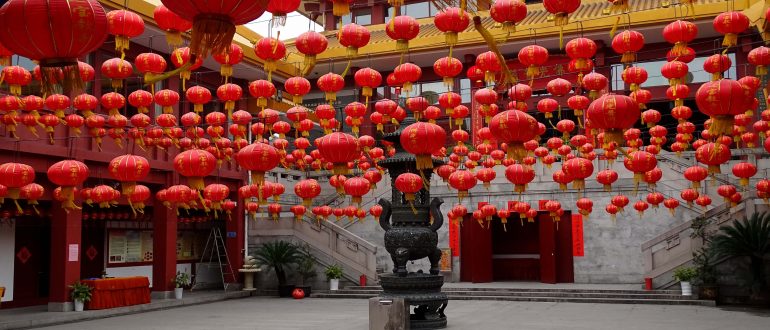
Race for Africa – China’s engagement on the African continent and the resulting challenges for the value-based trade policy of the European Union
1. Trade in Africa: Status Quo at stake?
Chinas economic rise – its GDP-growth rate has fluctuated between six and ten percent annually over the last decade (World Bank 20018) – suddenly made unprecedented foreign policy engagement possible. The country turned its gaze south-west: to Africa, whose Sub-Saharan region remains one of the fastest growing regions in the world. The question is no longer just how the West deals with the competing model of infrastructure and development aid. The European Union’s (EU) economic and security interests, which have been un-challenged for decades, are being troubled by Chinese incentives, which many African leaders can hardly ignore. Which answers and alternatives could the EU offer to sustain its value-based trade policy with Africa, to continue “business as usual”?
1.1 Challenges for the EU’s value-based trade policy
Even though economic, political and social ties bind ever closer, increasing global trade protectionism is observable. Meanwhile, the EU advocates for the removal of trade barriers and the consolidation of open markets. Its trade policy thereby not only serves the exchange of goods and services, but is also used as an instrument to enforce European values and interests (European Commission 2016; Wessels 2018). Cooperation with African, Caribbean and Pacific (ACP) countries is promoted through Economic Partnership Agreements (EPAs) on free trade, which aim on balancing trade deficits and establishing WTO directives (ibid.). The contractual basis for EPAs lies in the Cotonou Agreement, which was signed in 2000 and will, after 20 years of existence, expire this year.
Due to its colonial history as well as its relative geographical proximity, the Union is traditionally the largest trading partner of Africa. In 2017, 36 percent of African goods trade worth EUR 243.5 billion went to the EU, which is the primary market for African exports (European Commission 2018). It is therefore not surprising, that Sub Saharan African (SSA) countries, for the purpose of regionalization subdivided into East Africa, Southeast Africa, Southern Africa, West Africa and Central Africa, are mostly affected by EPAs (Giesbert et al. 2016). With the Cotonou Agreement, the EU committed itself to sustainably supporting SSA countries via reciprocal free trade agreements (ibid.: 2). Their raison d’être: contributing to peace and security while basing negotiations on Human Rights, Democratic Principles, the Rule of Law, and Good Governance (European Commission 2019).
During the last two decades, regional contexts and global challenges have evolved significantly. For the purpose of reviewing the core partnership objectives and adapting to new circumstances, the EU is seeking a new comprehensive political agreement containing a modern agenda and integrating internationally agreed roadmaps for sustainable development.
1.2 China’s rise in Africa
At the same time, changed political, economic, and technical framework conditions trigger an intensification of Chinese trade with third countries. The Middle Kingdom surges up as a competitor for the sphere of influence, which threatens to jeopardize historical monopoly position of the West in the “Race for Africa”.
Since 2009, the People’s Republic is the second largest trading partner of its “friend” (Xinhua 2015), the African continent, and the largest single trading partner of the Sub-Saharan countries. According to the International Monetary Fund, Sino-African trade in goods amounted to EUR 107 billion in 2017, which corresponds to 16 percent of African goods trade (European Commission 2018). Other sources even speak of USD 204.19 billion. However, caution should be exercised, at least on figures published by China, due to a reasonable suspicion of propaganda (Johns Hopkins University 2019; Cissé 2012; Grimm/Hackenesch 2014: 896). Chinese imports from Africa thus reached a new high and doubled the 2015 figures. Nevertheless, it was for a long time no parity trade: China, which describes itself as the “largest developing country in the world” (Wang 2018), is said to have imported goods worth of USD 47.53 billion in 2015, while more than tripling exports to USD 155.70 billion (ibid.). The goods structure thereby differs significantly from that of the EU. Africa mainly imports processed and finished goods, machinery and vehicles from China, but on the contrary also food and petroleum products from the EU (Germany Trade and Invest 2018: 7). Despite the significant increase in bilateral trade with developing countries, the share of African countries in China’s total trade volume is only around five percent. Indisputably, China’s role as an investor continues to grow: “The country’s share of foreign direct investment in Africa increased from 2.2 percent in 2010 to 4.9 percent in 2016” (ibid.). The scope of subsidized aid projects is also rising. As early as the 1960s, Zhou Enlai outlined the “eight principles for China’s development aid” as part of his strategy of “peaceful coexistence” (Grimm/Hackenesch 2014: 893). In addition to avoiding permanent dependence on the states concerned, the cornerstones are the “adaptation of Chinese experts in the implementation of development aid projects to local living standards” (ibid.: 894). During the last four decades, China is said to have conducted 800 aid projects in 53 African countries (Chen/Nord 2017).
China’s policy consciously established itself as an alternative to the West. In 2000, the International Development Cooperation Agency founded the Forum on China-Africa Cooperation. Under the title “a common future through win-win cooperation”, last year’s summit in Beijing represented a declaration of intent – cooperation is the only way to counter conflict, poverty and protectionism (Beijing Declaration 2018).[1]
3. Policy recommendations
The global acting of the EU has differentiated itself firstly with the endeavor to assert its own interests and, secondly, to realize its own normative vision through trade policy and development cooperation. In the area of Economic Partnership Agreements with Africa, the Union must not run the risk of losing credibility. Post-colonial relations with autocrats must not undermine the concern of prosperity through trade. In order to counteract the “absence of an echo to European foreign policy goals in third countries and regions” (Keukeleire and Raube 2019: 9), specification is needed: What benefits do ACP countries have from trade with the value-based EU? What (long-term) disadvantages do they incur in comparison to Sino-African trade?
Often criticized as being “too sloppy in enforcement” (ibid.: 9), the EU nevertheless sets an international novelty with its value-based trade policy. Contracting parties as well as the population of the member states covered by the contracts can rely on the observance of the values. However, “soft” incentives such as the rule of law and human rights often do not suffice in the negotiations with economically weak, partly autocratic governed regimes. What is instead convincing are increased foreign trade and investments along with a decline of unemployment. The EU needs more courage to invest on the African continent and attract attention through major projects – China recognized comparatively early that prestige projects were such an option. Famous examples are the deep-sea harbor in Cameroon or, still under construction, a railway line connecting Kenia, Ruanda, Uganda, Burundi and South Sudan (Hütz-Adams et al. 2014: 11-21).
The argument that the EU as the “center” regards Africa as an unequal “periphery” can only be countered if the negotiations do take place on equal footing. Bilateral tariff dismantling and thus simultaneous market liberalization, as demanded by the WTO, would be possible solutions, even if macroeconomic doubts have been raised that African economies are not yet ready for it. Another policy recommendation is therefore the promotion and diversification of African industries. Whilst processing and refining should not only take place within the EU, the Union should invest into research and development hubs in African countries in order to scale division of labor up. The latter are challenged – with possible financial aid of the European Development Fund – to diversify their industrial and export sectors while tackling capacity and infrastructural issues. If macroeconomies do not adapt structurally, the African side will not profit from a mutual market opening but see a development of its infant industries at risk. Globalization and ubiquitous connectivity foster a leapfrogging process that creates innovative and entrepreneurial societies with Kenyan, Ghanaian or Nigerian start-ups inspiring the digital scene.
China is undoubtedly using the African continent to test and expand its claim to great power. For Europe, nothing less than economic cooperation, the consolidation of democracy and the rule of law are at disposal.
[1] Another milestone in China’s foreign policy was the launch of the Chinese People’s Liberation Army Support Base in Djibouti in 2017. The People’s Liberation Army Navy’s first overseas base is expected to increase military presence and power projections at the Horn of Africa and in the Indian Ocean. For more information, please see: Huneke (2017).
4. Bibliography
Cissé, Daouda. 2012. FOCAC: trade, investments and aid in China-Africa relations. Stellenbosch: Centre for Chinese Studies Stellenbosch University.
Chen, Wenjie und Nord, Roger. 2017: A rebalancing act for China and Africa: The effects of China’s rebalancing on Sub-Sahara Africa’s trade and growth. Washington D.C.
European Commission. 21.06.2016. EU-Bericht belegt zunehmenden Protektionismus. Brussels.
European Commission. 2018. Die Handelspolitik der EU. https://ec.europa.eu/germany/handelspolitik_der_eu_de. Accessed: 3 November 2019.
European Commission. 2019. State of play – Economic Partnership Agreements. https://trade.ec.europa.eu/doclib/docs/2009/september/tradoc_144912.pdf. Accessed: 5 November 2019.
FOCAC. 2018. Beijing Declaration: Toward an Even Stronger China-Africa Community with a Shared Future. Beijing.
Giesbert, Lena; Pfeiffer, Birte and Schotte, Simone. 2016. Umstrittene Freihandelsabkommen mit der EU: Afrika unter (Handels-)Druck. Hamburg: GIGA.
Grimm, Sven and Hackenesch, Christine. 2014. Chinas Kooperation mit Afrika und Lateinamerika. In Länderbericht China, Ed. Doris Fischer und Christoph Müller-Hofstede, 889–914. Bonn: Bundeszentrale für politische Bildung.
Hütz-Adams, Friedel; Hummel, David and Knoke, Irene. 2014. Partnerschaft auf Augenhöhe? Die Rolle Chinas in Afrika. Bonn: SÜDWIND – Institut für Ökonomie und Ökumene.
Johns Hopkins University. 2019. Data: China-Africa Trade — China Africa Research Initiative. School of Advanced International Studies. http://www.sais-cari.org/data-china-africa-trade. Accessed: 15 September 2019.
Huneke, Douglas. 2017. The Ghost of Zheng He: China’s Naval Base in Djibouti. In Berkeley Political Review.
Keukeleire, Stephan and Raube, Kolja. 2019. Die EU als regionaler und globaler Akteur. In Handbuch Europäische Union, Ed. Peter Becker und Barbara Lippert, 1–13. Wiesbaden: Springer Fachmedien Wiesbaden.
Wang, Yuanhong. 2018. China remains largest developing country. http://global.chinadaily.com.cn/a/201804/16/WS5ad4343fa3105cdcf65187d6.html. Accessed: 25 October 2019.
Wessels, Wolfgang. 2018. Auswärtiges Handeln: Regelwerk und Praxis der Außenbeziehungen und der Gemeinsamen Außen- und Sicherheitspolitik. In Das Politische System der Europäischen Union, Ed. Wolfgang Wessels. Wiesbaden: Springer Fachmedien.
World Bank. 2018. GDP growth (annual %) – China. https://data.worldbank.org/indicator/NY.GDP.MKTP.KD.ZG?locations=CN. Accessed: 22 January 2020
Xinhua. 2015. Full Text: China‘s second Africa policy paper. http://www.chinadaily.com.cn/world/XiattendsParisclimateconference/2015-12/05/content_22632874.htm. Accessed: 15 July 2019.
Zamfir, Ionel. 2016. Afrikas Wirtschaftswachstum: Durchstart oder Verlangsamung? Wissenschaftlicher Dienst des Europäisches Parlament. Brussels.

Lara Natascha Bühler
Lara is currently pursuing her last Master semester in Security Studies at Sciences Po’s Paris School of International Affairs, as part of her degree in International Relations – European Studies at Andrássy University in Budapest. She holds a BA in Economics and Sinology, studying at Shanghai Jiaotong University and working for the German Chamber of Commerce in Shanghai, where she conducted the Chambers’ Corporate Social Responsibility initiative. Lara is combining her research interest in China with EU policy making, focusing on Public Diplomacy, trade and foreign policy. A recent internship at the German parliament allowed her to further develop her practical experience.
